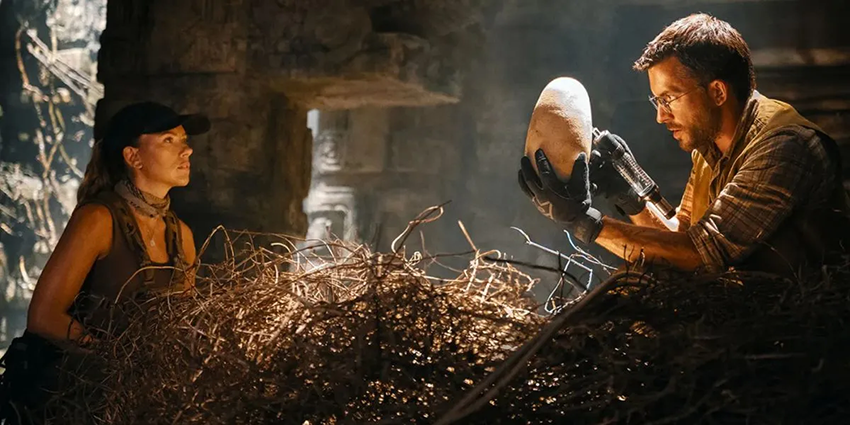Review: Jurassic World Rebirth
Set five years after the events of Jurassic World: Dominion, Jurassic World Rebirth introduces a new chapter in the franchise, focusing on the intersection of climate change, corporate ambition, and the ethical dilemmas of genetic manipulation. Directed by Gareth Edwards and written by David Koepp, the film stars Scarlett Johansson as Zora Bennett, a covert operative, and Jonathan Bailey as Dr. Henry Loomis, a dedicated paleontologist. They are joined by Mahershala Ali as Duncan Kincaid, the mission leader, and Rupert Friend as Martin Krebs, a pharmaceutical executive.
The plot centres on a mission to Ile Saint-Hubert, a (fictional) remote island where a previous laboratory created genetically modified dinosaurs. The island was abandoned after a catastrophic incident involving a six-limbed tyrannosaur known as “Distortus Rex” or D-Rex.
Now, with Earth’s environment becoming increasingly inhospitable to the surviving dinosaurs rapidly experiencing a second extinction, a pharmaceutical company, ParkerGenix, seeks to retrieve DNA samples from the remaining prehistoric creatures to develop a groundbreaking medical treatment to prevent heart disease.
Johansson’s Zora Bennett leads the expedition, bringing her military expertise to navigate the dangers of the island. Bailey’s Dr. Loomis provides scientific insight, emphasising the importance of ethical considerations in their mission. Ali’s Duncan Kincaid oversees the operation, balancing corporate interests with the team’s safety. Friend’s Martin Krebs represents the pharmaceutical company’s drive for innovation, often clashing with the team’s caution.
Among the strongest creative choices made by director Gareth Edwards is the inclusion of the abandoned raft scene from Michael Crichton’s original Jurassic Park novel. It appears in Rebirth as a tense midpoint with a young family who has been caught up in the action on the island and who are separated from Zora, Henry and Duncan.
The film delves into the consequences of human intervention in nature, particularly the implications of reviving extinct species and altering their genetics. As the team encounters various challenges on the island, including unpredictable dinosaur behaviour and environmental hazards, they are forced to confront the moral complexities of their mission. The narrative raises questions about the responsibility humans bear when manipulating life and the potential repercussions of such actions.
Jurassic World Rebirth combines thrilling action sequences with thoughtful exploration of bioethics and environmental issues. By focusing on the realistic challenges of sustaining de-extinct species in a changing climate and the ethical dilemmas of genetic experimentation, Jurassic World Rebirth offers a nuanced addition to the franchise. It prompts audiences to consider the broader implications of scientific advancement and the importance of respecting natural boundaries.
Rather than treating the dinosaurs as unstoppable threats or magical relics, Jurassic World Rebirth darker tone shows them as they are: living creatures caught in a story about power, fear, and the refusal to accept limits. In doing so, it feels closer to Crichton’s original vision—one where awe and dread live side by side, and where playing God carries a cost that can’t be fully counted.
Jurassic World Rebirth has all the action set pieces fans expect from this franchise, but the film refuses to end on an optimistic note and doesn’t offer a clear moral or easy answers or offer quick redemption. By the end, the dinosaurs remain endangered. New medical interventions will help “everyone”, but climate-driven habitat collapse continues. The team returns to a world that has moved on, carrying the knowledge that scientific skill can’t always undo what human ambition sets in motion.





